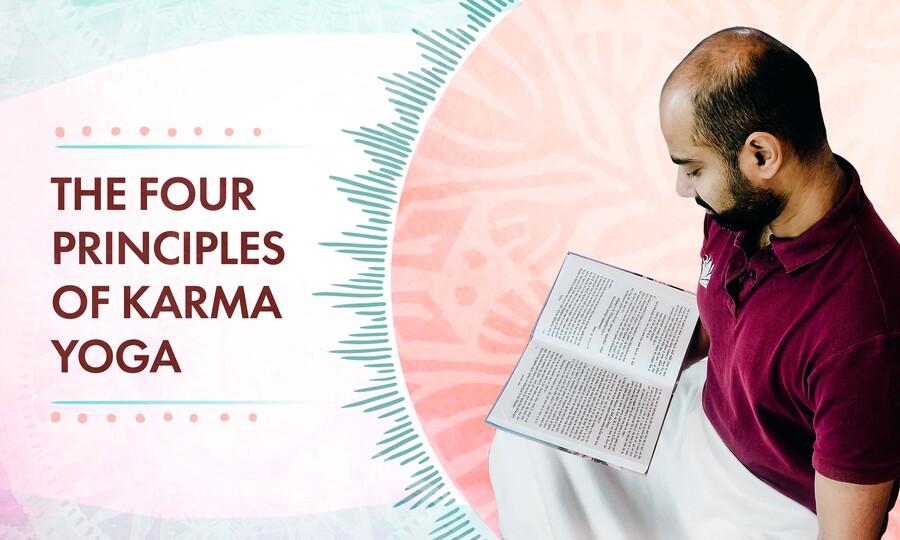In yoga philosophy, Karma is the law of cause and effect. Every action you take has a consequence, whether immediate or in the future. Positive actions lead to positive karmic reactions, while negative actions result in what we know today as ‘bad karma’. Karma operates across lifetimes, with the consequences of actions in past lives coming back in the present life.
Karma Yoga is a path to break this karmic cycle and discover our true selves, free from ego or attachment. Known as the “Yoga of Action," Karma Yoga is the selfless performance of duties, where the focus is not on the fruits or outcomes but on the action itself. Continue reading to discover the true meaning of Karma Yoga, its benefits, and how you can practice it in your daily life.What Is the Meaning of Karma Yoga?
The word Karma means “action,” so Karma Yoga is the “Yoga of Action” or “Duty.” As one of the Four Paths of Yoga, which includes Bhakti Yoga (Yoga of Devotion), Jnana Yoga (Yoga of Knowledge), and Raja Yoga (Yoga of Control), it encourages action without any attachment to the results or outcomes. As Shri Krishna says in the Bhagavad Gita:“Do your duty without the concern to the fruit of it”
The 4 main principles of Karma Yoga are:
- Duty
- Ego
- Attachment
- Expectation of reward
The main purpose of Karma Yoga is to control and let go of your ego, thereby purifying the mind and helping us realize our true Self. To do this, we need to engage with our duties without attachment or personal desires.
Misconceptions about Karma Yoga
Although volunteering our time to help others is a common example of selfless action, the true essence of this practice goes beyond simple acts of kindness. To clear up any misconceptions, here is what Karma Yoga is not:
A Transaction
Selfless action is not an exchange, where you provide a service in return for another, like a training course or accommodation. The essence of Karma Yoga is performing actions without the expectation of any rewards or returns.
Free Work
Simply working without fair compensation does not automatically qualify as selfless action . True Karma Yoga is about the internal detachment from the fruits of the action, not just the absence of a financial transaction. It's about selfless intent and not being attached to outcomes.
Cheap Labor
Just because someone is willing to work for less in the name of Karma Yoga, doesn't mean it aligns with its principles. True selfless action is never about undervaluing oneself or others but about performing your duty with pure intent.
Social Service
While social service aligns with the principles of Karma Yoga, not all acts of social service qualify as selfless action. The distinguishing factor is the internal motivation and detachment from the outcome. For instance, if someone helps in a community with the hope of recognition or personal satisfaction, it's not in the true spirit of this practice.
So, while it is true that the Yoga of Action is rooted in the actions you make, if your intention is anything other than doing a duty without ego or attachment, it is not Karma Yoga.

Discover yoga philosophy principles to boost your happiness
Get free access to a life-changing series of 6 webinars with Arhanta Yoga founder Ram Jain
The Four Principles of Karma Yoga Explained
1. Duty
Everybody has duties in life. Some are because of society or family, while others are choices we make, like being a good boss or supportive friend. In Karma Yoga, duties are known as dharma, and recognizing and ranking them is key.
While understanding our role in other people's lives is fundamental, the highest obligation you have is towards yourself. Only by ensuring your well-being can you effectively support others. Moreover, any duty you perform should be done with diligence. Whether tidying a room or completing a task at work, it should reflect your best efforts.
2. Ego
Ego is your self-image and the thoughts you have about yourself and others, shaped by characteristics such as your likes, dislikes, and desires. Often, we base our actions on how they'll affect our image. While some believe ego helps them perform better, it can also be harmful. Ego can distort our view of reality and cloud our understanding.
In contrast, selfless action is about performing duties without thinking about yourself. The core goal of this practice is to manage and eventually free yourself from ego.
3. Attachment
Karma Yoga is about doing your duty impartially, without getting attached to it. Whether you enjoy the task or not, you give it your all. For instance, as a teacher, you wouldn't favor one student over another. The focus is on performing the duty, without concern for the outcome or the process.
4. Expectation of Reward
We often act with the expectation of a return. This could be working for a paycheck or recognition, or even caring for loved ones in hopes of receiving their love and gratitude. But when you act without expecting rewards, the result doesn’t influence your actions. You do it because it's the right thing to do, not for personal gain. This is Karma Yoga.
Read more: Karma and Dharma - Are you doing it right?
Benefits of Karma Yoga
Karma Yoga has many benefits. Some of these can be seen immediately, while others will only be realized after consistent regular practice. Here are three significant benefits of selfless action:
Reduces Ego
Karma Yoga helps you act without letting your ego get in the way. You do what needs to be done rather than what you feel like doing. Over time, this reduces your ego and helps you think and act with pure intention.
Priorities Become Clearer
By practicing Karma Yoga, you get a clear idea of what's important. You understand your responsibilities and do them without getting too attached or making it about yourself.
Balances Karma
Since you're doing tasks without letting ego or personal desires interfere, you can fix past wrongs without creating new ones.
How to Practice Karma Yoga Daily
To practice karma yoga in your daily life, follow these simple steps:
1. List Your Core Duties
Everyone plays multiple roles in their lives. In order to practice Karma Yoga, you first need to inspect your relationships in the light of yoga philosophy and distinguish between the roles we play for personal gain from those we do without expecting anything in return. Identifying your duty in your relationships helps you make the right choices.
2. Rank & Prioritize Them
Not all roles and duties carry the same weight in different phases of life. By prioritizing them, you don't just organize them based on their importance, but you also reflect on the significance of your contribution to each role. This can also help in allocating your time and energy more effectively. Recognizing the importance of each role can also instill a sense of purpose, aligning more closely with the principles of Karma Yoga.
3. Fulfill Your Duties
Karma Yoga is about consistency and dedication. Once you have your roles outlined and prioritized, actively engage in fulfilling them on a daily basis. This doesn’t mean you have to do everything perfectly, but rather approach each role with dedication, sincerity, and without any expectations of a reward.Final Thought
Incorporating Karma Yoga in daily life is about consistent selfless action and detaching yourself from the outcomes. By reflecting on our roles, understanding their significance, and approaching them with a pure intent, we can build stronger relationships and cultivate a happier, more meaningful life.

Discover yoga philosophy principles to boost your happiness
Get free access to a life-changing series of 6 webinars with Arhanta Yoga founder Ram Jain

